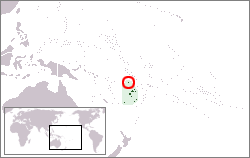 |
|---|
| This article is part of a series on the politics and government of Fiji |
Legislative
|
Judiciary |
|
General elections were held in Fiji between 18 and 25 February 1994. [1] This election, the second since Fiji had become a republic following two military coups in 1987, was brought about by splits within the ruling Soqosoqo ni Vakavulewa ni Taukei (SVT) and by the withdrawal of the support of the Fiji Labour Party, which claimed that Prime Minister Sitiveni Rabuka had reneged on a deal to review Fiji's electoral system, which was heavily weighted in favour of ethnic Fijians, despite their being nearly equal in number to Indo-Fijians.

Fiji, officially the Republic of Fiji, is an island country in Melanesia, part of Oceania in the South Pacific Ocean about 1,100 nautical miles northeast of New Zealand's North Island. Its closest neighbours are Vanuatu to the west, New Caledonia to the southwest, New Zealand's Kermadec Islands to the southeast, Tonga to the east, the Samoas and France's Wallis and Futuna to the northeast, and Tuvalu to the north. Fiji consists of an archipelago of more than 330 islands—of which 110 are permanently inhabited—and more than 500 islets, amounting to a total land area of about 18,300 square kilometres (7,100 sq mi). The most outlying island is Ono-i-Lau. The two major islands, Viti Levu and Vanua Levu, account for 87% of the total population of 898,760. The capital, Suva, on Viti Levu, serves as the country's principal cruise-ship port. About three-quarters of Fijians live on Viti Levu's coasts, either in Suva or in smaller urban centres such as Nadi—where tourism is the major local industry—or Lautoka, where the sugar-cane industry is paramount. Due to its terrain, the interior of Viti Levu is sparsely inhabited.

The Fijian coups of 1987 resulted in the overthrow of the elected government of Fijian Prime Minister Timoci Bavadra, the deposition of Elizabeth II as Queen of Fiji, and in the declaration of a republic. The first coup, in which Bavadra was deposed, took place on 14 May 1987; a second coup on 28 September ended the monarchy, and was shortly followed by the proclamation of a republic on 7 October. Both military actions were led by Lieutenant Colonel Sitiveni Rabuka, then third in command of the Royal Fiji Military Forces. Depending on perspective, one may view the event either as two successive coups d'état separated by a four-month intermission, or as a single coup begun on 14 May and completed with the declaration of the republic.

The Soqosoqo ni Vakavulewa ni Taukei (SVT), occasionally known in English as Fijian Political Party, was a party which dominated politics in the 1990s and was the mainstay of coalition governments from 1992 to 1999.
The election produced little change among the 38 seats in the House of Representatives that were reserved for ethnic Fijians and Rotuman Islanders. The SVT won 33 seats (a gain of three), and the Fijian Association Party of former Finance Minister Josefata Kamikamica won five (one down). The Fijian Nationalist Party of Sakeasi Butadroka, which advocated the forced repatriation of all Fijians of Indian descent, lost the three seats that it had won in the previous election. The five "general electorates," reserved for Fiji's European, Chinese, and other minorities, showed similarly little change, with the General Voters Party winning four seats and the All Nationals Congress, one. There was a very significant change in the composition of the 27 Indo-Fijian seats, however. The Fiji Labour Party lost 6 of its 13 seats, with the National Federation Party winning the remaining 20. The NFP leader, Jai Ram Reddy, enjoyed a personal rapport with Rabuka; although they did not enter into a formal coalition, their negotiations led to a substantial overhaul of the Fijian Constitution which paved the way for the historic election of 1999, which brought Fiji's first Indo-Fijian Prime Minister, Mahendra Chaudhry, to power.

The House of Representatives was the lower chamber of Fiji's Parliament from 1970 to 2006. It was the more powerful of the two chambers; it alone had the power to initiate legislation. The House of Representatives also had much greater jurisdiction over financial bills; the Senate could not amend them, although it might veto them. Except in the case of amendments to the Constitution, over which a veto of the Senate was absolute, the House of Representatives might override a Senatorial veto by passing the same bill a second time, in the parliamentary session immediately following the one in which it was rejected by the Senate, after a minimum period of six months.

Rotuma is a Fijian dependency, consisting of Rotuma Island and nearby islets. The island group is home to a large and unique indigenous ethnic group which constitutes a recognisable minority within the population of Fiji, known as "Rotumans". Its population at the 2007 census was 2,002, although many more Rotumans live on mainland Fijian islands, totaling 10,000.

The Fijian Association Party (FAP) is a former political party in Fiji. It played a significant role in Fijian politics throughout the 1990s, but lost all of its seats in the House of Representatives in the parliamentary election of 2001.
Following the 1994 election, Rabuka formed a coalition with the General Voters Party and remained Prime Minister.


